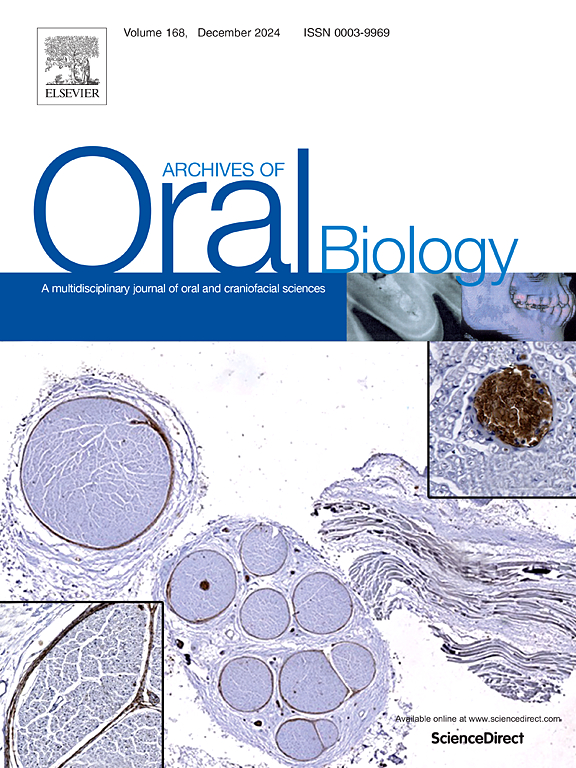Impact of temporomandibular disorder on food preference behavior in adult male rats
IF 2.2
4区 医学
Q2 DENTISTRY, ORAL SURGERY & MEDICINE
引用次数: 0
Abstract
Objective
Temporomandibular disorders (TMD) are a group of conditions affecting the jaw, surrounding muscles and associated structures. Researches indicate that TMD has implications for changes in nutritional behavior. This study investigates the impact of TMD on the food preference behavior of rats, examining various food models with differing caloric content, taste, and texture.
Design
Forty-two male Wistar rats (200–250 g) were divided into six groups, comprising three control and three pain or TMD groups. Induction of TMD by injection of complete Freund adjuvant (CFA) into the left temporomandibular joint (TMJ) of rat serves as a model for studying TMD. Twenty-four hours post-TMD induction, the preference of animals to foods with differences in calories, taste and texture was evaluated with the help of an automatic preference measuring device.
Results
In terms of caloric preferences, the pain group exhibited a distinct shift towards high-calorie food. Taste preferences were marked by an increased preference for sweet food in the pain group. Texture preferences were altered, with the pain group displaying a preference for low-texture food.
Conclusion
TMD in rats leads to increased preferences for high-calorie and sweet foods, as well as altered preferences for food textures. These findings highlight the influence of TMJ pain on food preference behavior in rats.
颞下颌关节紊乱对成年雄性大鼠食物偏好行为的影响
目的颞下颌关节紊乱症(TMD)是一组影响颌骨、周围肌肉和相关结构的疾病。研究表明,TMD 会影响营养行为的变化。本研究调查了 TMD 对大鼠食物偏好行为的影响,研究了各种不同热量、口味和质地的食物模型。设计将 42 只雄性 Wistar 大鼠(200-250 克)分为 6 组,其中包括 3 个对照组和 3 个疼痛或 TMD 组。在大鼠左侧颞下颌关节(TMJ)注射全氟佐剂(CFA)诱导 TMD,作为研究 TMD 的模型。在诱导 TMD 24 小时后,利用自动偏好测量仪评估了动物对热量、味道和质地不同的食物的偏好。口味偏好方面,疼痛组对甜食的偏好明显增加。结论颞下颌关节紊乱导致大鼠对高热量和甜味食物的偏好增加,并改变了对食物质地的偏好。这些发现突显了颞下颌关节疼痛对大鼠食物偏好行为的影响。
本文章由计算机程序翻译,如有差异,请以英文原文为准。
求助全文
约1分钟内获得全文
求助全文
来源期刊

Archives of oral biology
医学-牙科与口腔外科
CiteScore
5.10
自引率
3.30%
发文量
177
审稿时长
26 days
期刊介绍:
Archives of Oral Biology is an international journal which aims to publish papers of the highest scientific quality in the oral and craniofacial sciences. The journal is particularly interested in research which advances knowledge in the mechanisms of craniofacial development and disease, including:
Cell and molecular biology
Molecular genetics
Immunology
Pathogenesis
Cellular microbiology
Embryology
Syndromology
Forensic dentistry
 求助内容:
求助内容: 应助结果提醒方式:
应助结果提醒方式:


